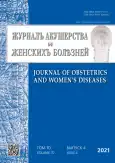Regulation of the functional activity of peripheral B lymphocytes in pregnant women with a history of recurrent miscarriage
- Authors: Malyshkina A.I.1, Sotnikova N.Y.1, Voronin D.N.1, Kust A.V.1
-
Affiliations:
- Ivanovo Research Institute of Maternity and Childhood named after V.N. Gorodkov
- Issue: Vol 70, No 4 (2021)
- Pages: 73-79
- Section: Original study articles
- URL: https://journal-vniispk.ru/jowd/article/view/62675
- DOI: https://doi.org/10.17816/JOWD62675
- ID: 62675
Cite item
Abstract
BACKGROUND: The frequency of recurrent miscarriage is up to 5 % of all desired pregnancies and is mainly due to immunological disorders. Dysfunction in the regulation of the functional activity of B lymphocytes is the pathogenetic link in multiple obstetric complications, including habitual miscarriage.
AIM: The aim of this study was to characterize the regulation of the functional activity of peripheral B lymphocytes in pregnant women with threatened spontaneous miscarriage and a history of habitual miscarriage.
MATERIALS AND METHODS: We examined 88 women aged 18-40 years at a gestation period of 5-12 weeks. The main group consisted of 36 patients with threatened spontaneous miscarriage at the time of examination and a history of habitual miscarriage. The control group included 28 women with uncomplicated pregnancy. The comparison group consisted of 24 primary pregnant patients with threatened spontaneous abortion at the time of examination. BAFF and APRIL levels in the blood serum were determined by enzyme immunoassay. The content of CD19+BAFFR+ B lymphocytes in the lymphocyte gate was evaluated in the peripheral blood by flow cytometry using monoclonal antibodies. Akt mRNA expression was assessed using real-time reverse-transcription quantitative polymerase chain reaction. CD19+ В lymphocytes were isolated by direct magnetic separation.
RESULTS: In the main group, there was an increase in expression of BAFF receptors on peripheral CD19+ B lymphocytes and a decrease in the serum BAFF concentration compared to the parameters in the other study groups. We also found a pronounced trend towards a decrease in the serum APRIL level in the main and comparison groups of patients compared to healthy pregnant women. Besides, Akt mRNA expression in peripheral CD19+ B lymphocytes was increased in the main group.
CONCLUSIONS: Threatened habitual abortion is associated with the deficit of the regulatory influence of BAFF and APRIL, which is expressed in the disruption of B cell homeostasis and the weakening of humoral effector mechanisms.
Keywords
Full Text
##article.viewOnOriginalSite##About the authors
Anna I. Malyshkina
Ivanovo Research Institute of Maternity and Childhood named after V.N. Gorodkov
Email: anna_im@mail.ru
ORCID iD: 0000-0002-1145-0563
MD, Dr. Sci. (Med.), Professor
Russian Federation, 20 st. Victory, IvanovoNatalia Y. Sotnikova
Ivanovo Research Institute of Maternity and Childhood named after V.N. Gorodkov
Email: niimid.immune@mail.ru
ORCID iD: 0000-0002-0608-0692
MD, Dr. Sci. (Med.), Professor
Russian Federation, 20 st. Victory, IvanovoDmitriy N. Voronin
Ivanovo Research Institute of Maternity and Childhood named after V.N. Gorodkov
Email: niimid.immune@mail.ru
ORCID iD: 0000-0003-2836-8694
Cand. Sci. (Biol.)
Russian Federation, 20 st. Victory, IvanovoAlena V. Kust
Ivanovo Research Institute of Maternity and Childhood named after V.N. Gorodkov
Author for correspondence.
Email: avkMD@yandex.ru
Russian Federation, 20 st. Victory, Ivanovo
References
- Komilzhanova DK. The role of antiphospholipid syndrome in the prevention of miscarriage. Biology and Integrative Medicine. 2017;(5):21–27. (In Russ.)
- Dobrokhotova YuE, Gankovskaya LV, Bakhareva IV, et al. Role of immune mechanisms in the pathogenesis of miscarriage. Obstetrics and Gynecology. 2016;(7):5–10. (In Russ.). doi: 10.18565/aig.2016.7.5-10
- Batrak NV, Malyshkina AI, Sotnikova NYU, et al. The role of cd178+ mononuclear cells in the development of threatened late abortion in women with first-trimester threatened pregnancy interruption and a history of recurrent miscarriage. Obstetrics and Gynecology. 2020;(5):70–77. (In Russ.). doi: 10.18565/aig.2020.5.70-77
- Lima J., Cambridge G., Vilas-Boas A. et al. Serum markers of B-cell activation in pregnancy during late gestation, delivery, and the postpartum period. Am J Reprod Immunol. 2019;81(3):e13090. doi: 10.1111/aji.13090
- Hu S, Wang R, Zhang M, et al. BAFF promotes T cell activation through the BAFF-BAFF-R-PI3K-Akt signaling pathway. Biomed Pharmacother. 2019;114:108796. doi: 10.1016/j.biopha.2019.108796
- Zheng N, Wang D, Ming H, et al. BAFF promotes proliferation of human mesangial cells through interaction with BAFF-R. BMC Nephrol. 2015;16:72. doi: 10.1186/s12882-015-0064-y
- Samy E, Wax S, Huard B, et al. Targeting BAFF and APRIL in systemic lupus erythematosus and other antibody-associated diseases. Int Rev Immunol. 2017;36(1):3–19. doi: 10.1080/08830185.2016.1276903
- Matsuda Y, Haneda M, Kadomatsu K, Kobayashi T. A proliferation-inducing ligand sustains the proliferation of human naïve (CD27⁻) B cells and mediates their differentiation into long-lived plasma cells in vitro via transmembrane activator and calcium modulator and cyclophilin ligand interactor and B-cell mature antigen. Cell Immunol. 2015;295(2):127–136. doi: 10.1016/j.cellimm.2015.02.011
- Xu J, Luo X, Qu S, et al. B cell activation factor (BAFF) induces inflammation in the human fallopian tube leading to tubal pregnancy. BMC Pregnancy Childbirth. 2019;19(1):169. doi: 10.1186/s12884-019-2324-5
- Guo WJ, Qu X, Yang MX, et al. Expression of BAFF in the trophoblast and decidua of normal early pregnant women and patients with recurrent spontaneous miscarriage. Chin Med J (Engl). 2008;121(4):309–315.
- Frolova MV. The character of baff production and reception during pregnancy complicated intrauterine growth retardation. Russian journal of immunology. 2016;19(2(1):215–216. (In Russ.)
- Danaii S, Ghorbani F, Ahmadi M, et al. IL-10-producing B cells play important role in the pathogenesis of recurrent pregnancy loss. Int Immunopharmacol. 2020;87:106806. doi: 10.1016/j.intimp.2020.106806
- Chan CT, Lieu M, Sobey CG, et al. Diagnosing and treating hypertensive disorders of pregnancy? The answer may now be less BAFF-ling. Hypertension. 2017;70(5):884–886. doi: 10.1161/HYPERTENSIONAHA.117.09849
- Jiang N, Dai Q, Su X, et al. Role of PI3K/AKT pathway in cancer: the framework of malignant behavior. Mol Biol Rep. 2020;47(6):4587–4629. doi: 10.1007/s11033-020-05435-1
- Ogunleye O, Campo B, Herrera D, et al. Relaxin confers cytotrophoblast protection from hypoxia-reoxygenation injury through the phosphatidylinositol 3-kinase-Akt/protein kinase B cell survival pathway. Am J Physiol Regul Integr Comp Physiol. 2017;312(4):R559–R568. doi: 10.1152/ajpregu.00306.2016
- Lima J, Cambridge G, Vilas-Boas A, et al. Serum markers of B-cell activation in pregnancy during late gestation, delivery, and the postpartum period. Am J Reprod Immunol. 2019;81(3):e13090. doi: 10.1111/aji.13090
Supplementary files






